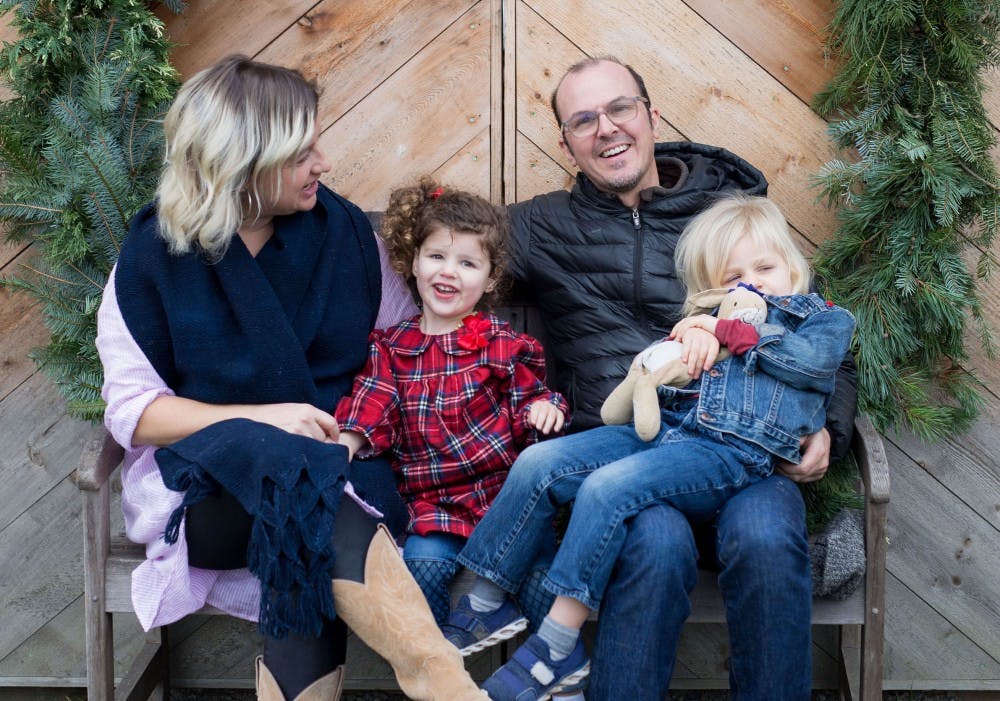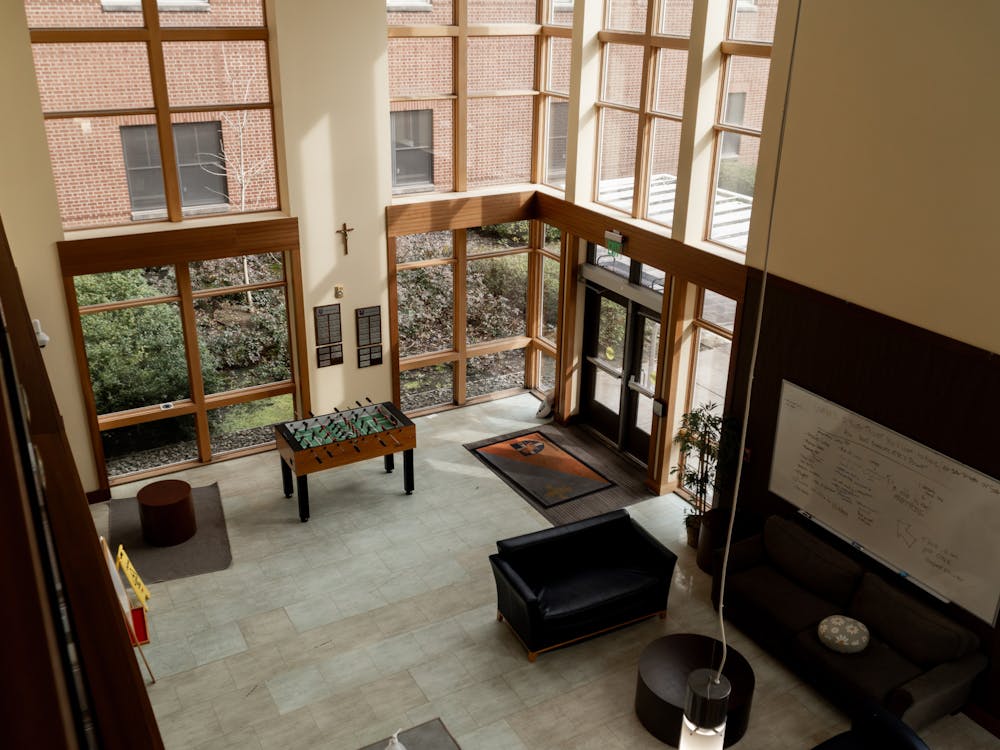It’s a cloudy day at The Croft Farm, where communication professor Vail Fletcher lives with her partner Greg, and their two children: three-year-old daughter Poppy and four-year-old son Huckleberry. The kids are full of energy, stomping in the mud and riding around on their scooters.
Fletcher says to the kids, “Okay we’re gonna do a race. Whoever comes in first will be eternally loved by all the earth and its creatures forever. And whoever comes in second will also have all of that. Ready, set, go!” The children sprint across a green field and make their way to the finish line: their front porch. Huckleberry takes the win.
Fletcher balances being a mom and taking care of the farm with being a full-time professor. She has been a professor at UP for nine years and teaches several courses including Gender and International Development, Environmental Communication and Advanced Interpersonal Communication, to name a few. As a professor, she tries to get students to “question reality.”
“I really want classes that sort of disrupt people’s sense of the world and not just for the sake of disruption but for the purpose of creating a kinder, gentler world,” Fletcher said. “I teach often with sort of an intense emotional expressiveness.”
Fletcher and her partner, Greg Stamp, bought their seven-acre property on Sauvie Island six years ago when it was nothing more than a field. Stamp has hand built every structure on their farm, including their house, their barn, greenhouse and chicken coop. While Fletcher teaches during the day, Stamp works on the farm.
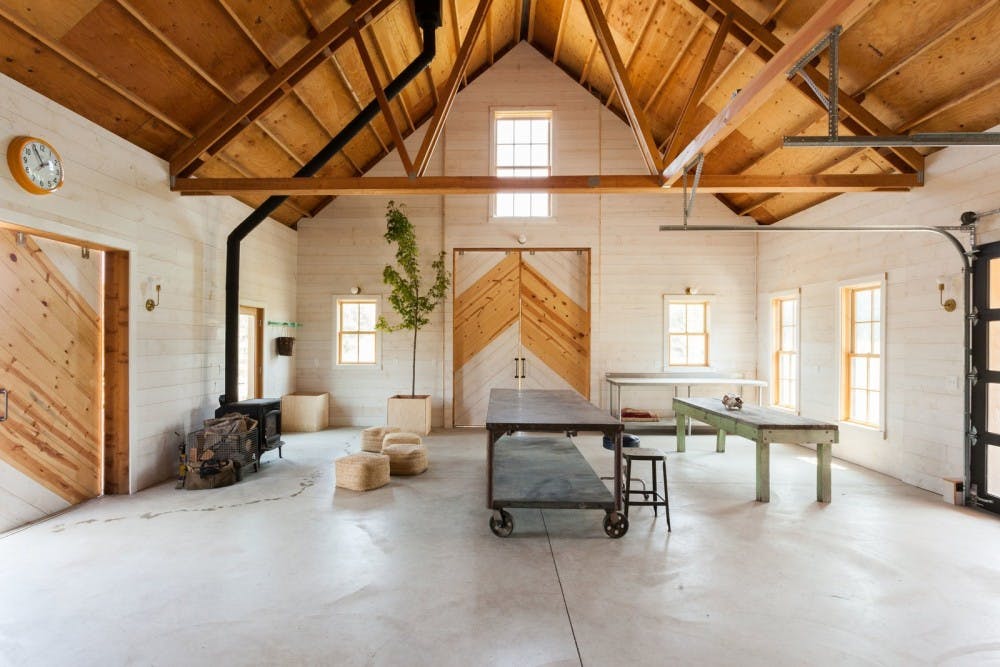
Stamp hand built their barn, which serves as multipurpose space for events like the Portland Food Swap and for their farm stand in the summers. Photo courtesy of Fletcher.
In the summers, Fletcher and Stamp host a farm stand, where they sell home-grown vegetables and succulents, and a “You-Pick,” where people can pick their own blueberries from their 2,000 pesticide-free bushes. They also collaborate with Bee Local to make honey and have 25 bee hives located on their property. In addition, every year, they host the Portland Food Swap, an event where people exchange homemade and locally harvested food items for free.
Fletcher said that the main purpose of their farm isn’t to turn over a profit. She believes that growing their own food is “fundamental to what it means to be a human.”
In addition to growing produce and raising animals, they also host an Airbnb, which they intentionally built into the design of their farm. Fletcher said that guests stay at their farm every night of the year, which she enjoys because she gets to meet people from all over the world.
On their property, they built two guest houses for their Airbnb visitors and finished the second one just last year. The space is bright, with big windows looking out onto the green pastures where the goats and sheep graze. It looks like it could be an ad for Pottery Barn or Ikea, but every item in the room was bought second-hand, down to the bed frame.

Stamp recently built their second guest house, and Fletcher did the interior decorating. Photo courtesy of Fletcher.
Fletcher is passionate about buying used items because it’s more sustainable and she believes that there are a lot of high quality items that get overlooked. She often goes to flea markets to collect used household items to sell at the farm stand.
When they’re not on the farm, Fletcher and her family travel the world. Last year, they spent six months in China on sabbatical, where Fletcher taught at the University of Beijing. They also travel to England to visit Stamp’s family.
Fletcher is used to travel. She got her PhD at the University of New Mexico, and did her dissertation research in Ethiopia and Uganda, where she studied how communalistic cultures resolve conflict. She also did a project in Rwanda, where she photographed and spoke to children about what it’s like to grow up in a country that has experienced mass trauma. The project was exhibited at the United Nations in New York.
Much of Fletcher’s research and many of the classes that she teaches are centered around feminism. In addition to teaching communication classes, she is also the co-director of the Gender and Women’s Studies minor. She said that her ideology is rooted in feminine values of care and nurture.
“It comes back to something that connects all of the things that I’m interested in, which is this idea of nurture capital, which is taking care of each other, taking care of those that are most vulnerable - the sick, the young, the elderly,” Fletcher said. “But I think also, taking care of the soil and taking care of non-human animals and wildlife and air quality and noise pollution. So I really feel like for me, being a feminist is about prioritizing care and nurture and equality and equitable policies, systems and structures.”
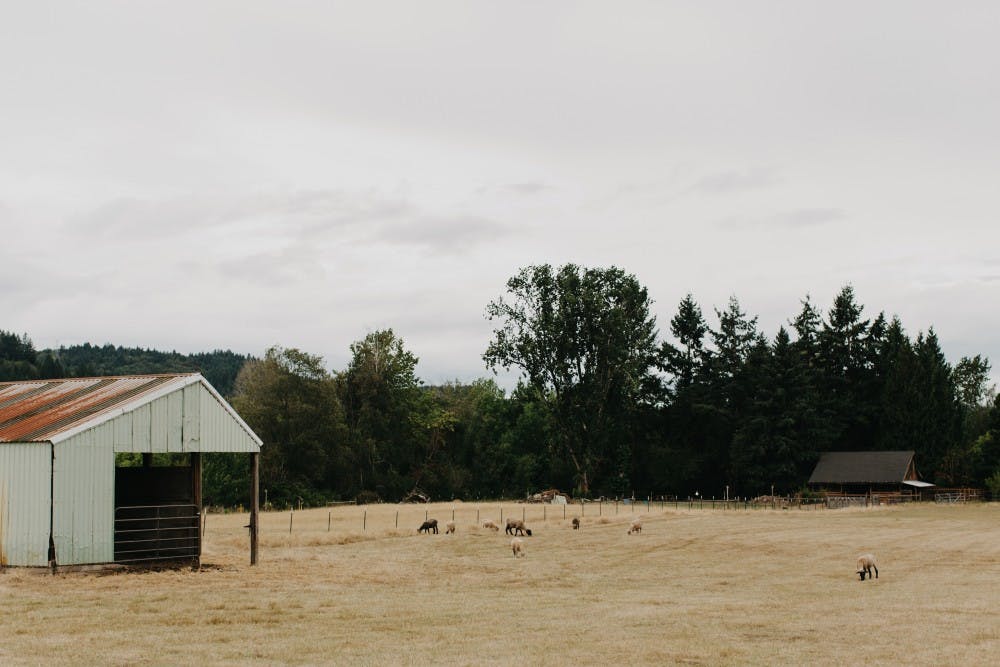
The sheep and goats graze on one of their fields during the summer. Photo courtesy of Fletcher.
Fletcher brings this same “nurture capital” to her farm. Walking around her property, she made sure not to step on any worms or beetles.
“This is a very special worm,” Fletcher said to her kids. “It’s our friend.”
Fletcher and Stamp met in Portland shortly after she moved here from southern California, where she was in a tenure-track position at Cal State in Los Angeles. Stamp, originally from southwest England, was the main buyer for Tazo Tea at the time. They met through mutual friends at a party.
“We went on one date and on our second date we just started planning our life,” Fletcher said.
Fletcher describes her and Stamp as being “quite different.” She only drinks coffee; he only drinks tea. She’s an assertive New Yorker; he’s polite and British. But together they’ve built their life around a shared love for nature and wildlife. She said that their lives are a lot of work, but they feel really fulfilled.
“Greg has a funny thing...I always say ‘how happy are you with your life on a scale of one to ten?’ and he always says ‘Well I’m a nine out of ten happy with my life and the only reason I’m a nine out of ten is because I’m British and you can’t be a ten out of ten and be British.’”
In the six years that they bought and built their farm, they also brought two children into the world -- Huckleberry, who has bleach blonde hair and a bright smile, and Poppy, who has dark curly hair and loves to play Hide and Seek. The inspiration behind their names comes from Fletcher and Stamp’s love for “flora and fauna.”
The kids spend the majority of their day running around on the farm while Stamp works. Fletcher said that her job at UP allows them to have a stable income and benefits, and Stamp’s job allows him to do most of the childcare during the day. Fletcher said that her kids usually have free reign and that she gives them the opportunity to be independent.
“I tell people that we under-parent,” she joked.

Poppy (left) and Huckleberry (right) smile big for the camera. Photo courtesy of Fletcher.
As the kids have gotten older, they’ve started to help their parents out on the farm by planting with their dad in the greenhouse and helping their mom feed the chickens, ducks and rabbits.
Fletcher said that a lot of their money goes towards taking care of their animals and living creatures on their farm. They try to have a fair and symbiotic relationship with their animals. The sheep give them wool, the bees give them honey and in return they provide nurture and health care, which means lots of trips to the vet.
Most of the animals at the farm are rescues, and every animal has name (the two goats are named Loni and Pippy). They also recently adopted sheep and will now use their wool to create fiber and yarn. Fletcher said they try to do everything they can to create ecosystems for as many living creatures as possible.
“We’ve become deeply intimate and deeply entangled with all these creatures, and we really love that,” Fletcher said.
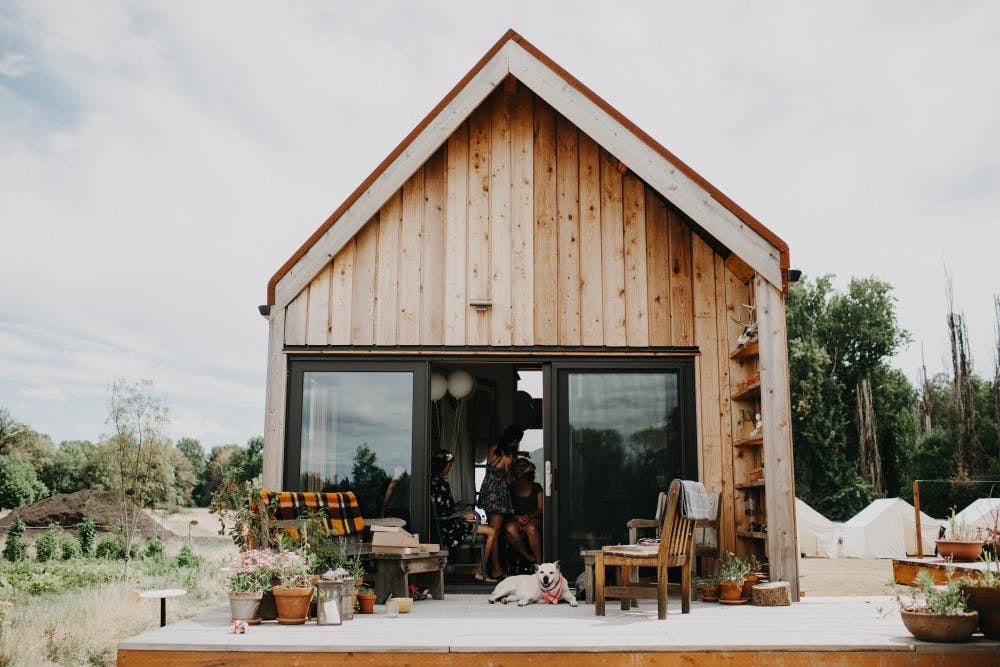
One of the guest houses on their property where AirBnb guests can stay. Photo courtesy of Fletcher.
Fletcher enjoys living on a farm and said that being physically present in an environment that grows food and takes care of animals is humbling. For her, living in close connection with nature serves as a daily reminder of how beautiful it is but also how removed we are from where our food comes from.
As a professor, Fletcher considers herself an activist in the classroom by choosing topics that are not often discussed in the media or in day-to-day interactions. Last fall, Fletcher taught Advanced Interpersonal Communication and said that she teaches it “from the dark side.” For one topic, her class talked about miscarriage, which Fletcher says is a common occurrence that has become invisible and should be talked about more.
“For me I think the reason that I talk about sad, hard, challenging things is because ideally I want us to grapple with things differently, maybe cope with things in ways that are more transformative. Healing. So that we can get to a more ideal place,” Fletcher said. “So I feel like I am constantly driven by an intense sense of urgency for revolution - a revolution of the heart, of the mind, of any sort of trappings of inequality and equity...So yeah maybe what I really want is just complete liberation.”
Brigid Lowney is the living editor at The Beacon. She can be reached at lowney19@up.edu.



